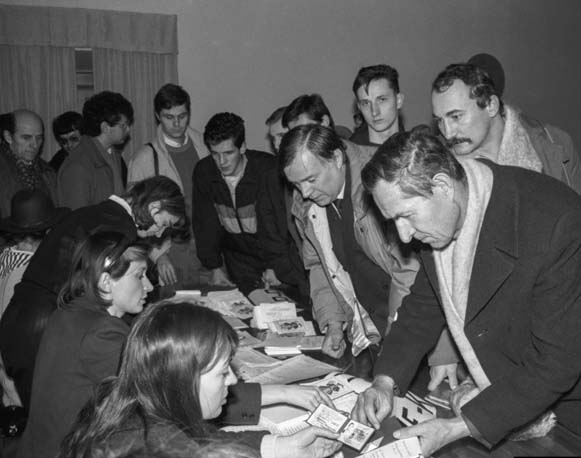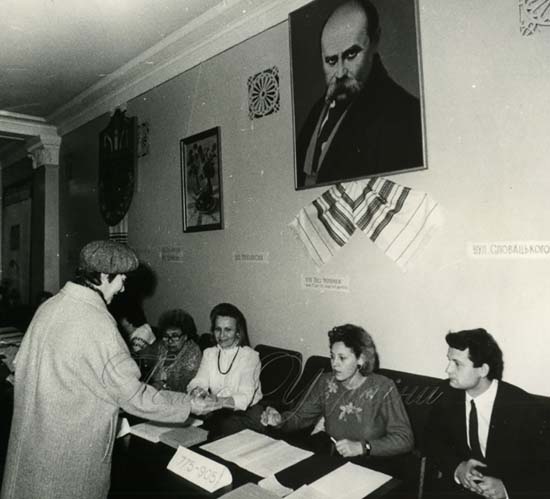Referendum
Referendum. A means of direct democracy in which citizens are asked to decide or to provide an opinion on a matter of public policy. In the case of Ukraine, referenda began to be used only towards the end of the Soviet era, and have been held or employed as a threat several times since then. From 2014, the Russian Federation has made use of the referendum device to legitimize its piecemeal dismemberment of independent Ukraine.
In an attempt to avoid the USSR’s disintegration, President Mikhail Gorbachev on 17 March 1991 ordered a Union-wide referendum. Soviet residents, including those in the Ukrainian SSR, were asked: ‘Do you consider necessary the preservation of the Union of Soviet Socialist Republics as a renewed federation of equal, sovereign republics, in which there will be in full measure guaranteed the rights and freedoms of people of all nationalities?’ Concurrently with the USSR question, Ukrainian lawmakers added a second one for the republic’s electorate. It asked: ‘Are you in agreement with the idea that Ukraine should be part of a Union of Soviet Sovereign States on the basis of the Declaration on the State Sovereignty of Ukraine?’ In response, 70.2 percent of the Ukrainian SSR’s voters responded ‘yes’ to the first (USSR) question, and 80.2 percent to the second (republic). Voter turnout was 83.7 percent. A majority of participants in this first-ever referendum in Ukraine at that time therefore simultaneously approved of both a modified status quo on the one hand, and a form of independence or at least sovereignty on the other—an ambiguous result.
Public sentiment in the Ukrainian SSR was clarified by the referendum held on 1 December 1991 in conjunction with the presidential election. The question asked was: ‘Do you endorse the Act Proclaiming the Independence of Ukraine?’ Ambiguity was eliminated by including in the ballot the text of the Act itself, passed by the Supreme Council of Ukraine in the wake of the abortive August coup in Moscow against Mikhail Gorbachev. On a turnout of 84.2 percent, 90.3 percent responded ‘yes,’ 7.6 percent ‘no,’ and 2.1 percent spoiled their ballots. This result indicated the direction the republic’s political leadership ought to take, leading to the Belavezha Agreement and the dissolution of the USSR.
President Leonid Kuchma used the referendum to hasten approval of the 1996 Constitution of Ukraine and then to try to extend his powers bypassing the Constitution. Following two years of work, the Constitutional Commission presented its draft to the Supreme Council of Ukraine on 11 March 1996 where it met with disagreement and discord on procedural matters. To prevent further delay, President Kuchma issued an edict of questionable constitutionality on 25 June calling for a referendum on the Constitution to be held on 25 September. In order not to have this vital decision taken out of their hands, the parliamentarians on 28 June after a marathon 23-hour session passed the Constitution by a vote of 315 to 36. The referendum was avoided, but it served its purpose.
Amidst controversy again as to its constitutionality, on 16 April 2000 a referendum initiated by the president offered citizens four proposals. They were: (1) to give the president additional powers of dissolving the Supreme Council of Ukraine should it fail in a given time to form a working majority or to approve the budget; (2) to deprive parliamentarians of immunity from criminal prosecution; (3) to reduce the assembly to 300 representatives from 450; and (4) to introduce a second chamber (bicameralism). Responses were 80 to 90 percent in favour of each question, but implementation was indefinitely deferred on account of political events (e.g., the Heorhii Gongadze scandal) and ultimately unfulfilled. This was a political act, overtaken by political events and never executed.
The Russian Federation’s surreptitious takeover of the Crimea in 2014 included the invaders’ hastily holding a referendum of doubtful validity on the peninsula’s status. With no voters’ lists or impartial international monitors, it was announced on 16 March 2014 that 97 percent of Crimean electors had voted in favour of joining the Russian Federation. The Crimean parliament duly declared independence, asked to be admitted to the Russian Federation, and the accession agreement was signed on 18 March in Moscow. According to an accidental and fleeting posting on a Kremlin website, the actual turnout was 30 percent with 50 percent in favor of annexation. In fact, the fate of the Crimea was decided by 15 per cent of the electorate.
A similar use of the referendum was made by Russian President Vladimir Putin in the midst of the full-scale Russo-Ukrainian war in 2022. In September 2022, hastily-organized referenda were conducted in the Russian-occupied portions of four oblasts: Luhansk oblast, Donetsk oblast, Kherson oblast, and Zaporizhia oblast. As the turnout rate was unreported and impartial monitors were not present, an unknown number of their inhabitants voted to incorporate the oblasts in their entirety (not only the occupied portions) into the Russian Federation by margins of 87 to 99 percent. On this basis, Putin signed a treaty effecting the annexation of the oblasts and making their inhabitants citizens of Russia ‘forever.’ As with the Crimean referendum, this was not recognized under international law.
According to the Constitution of Ukraine, a nation-wide referendum can be called by the Supreme Council of Ukraine or the President. It may also be initiated by the public through collecting no fewer than three million voters’ signatures in at least two thirds of oblasts with no fewer than 100,000 in each oblast. Only a nation-wide referendum can decide territorial changes in Ukraine. Hence, the regional referenda conducted by the Russian Federation in the Crimea and the Donbas, for example, were illegal under the Constitution. Referenda are not allowed on matters of taxation, the budget, or amnesty.
BIBLIOGRAPHY
‘Ihor Iukhnovs'kyi: pomer fizyk, iakyi buv avtorom ideï provesty referendum pro nezalezhnist' Ukraïny,’ BBC Ukrainian, 26 March 2024
Bohdan Harasymiw
[This article was written in 2024.]


